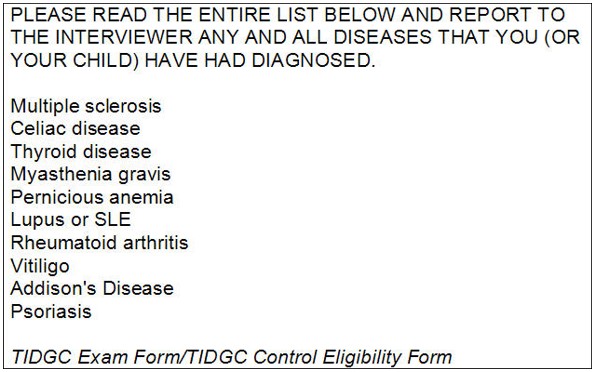Protocol - Autoimmune Diseases Related to Type I Diabetes
Description
The interviewer asks the respondents whether they (or their child) had certain autoimmune diseases. The study participants are handed a cue card to help them identify the autoimmune diseases that they or their child may have had.
Specific Instructions
The Expert Review Panel recommends that the list of diseases in Item 1 should also include autoimmune hepatitis, Guillain-Barré syndrome, and Sjögren’s syndrome
Availability
This protocol is freely available; permission not required for use.
Protocol
1. Do you (Does your child) have any of the following diseases?
HAND PARTICIPANT CUE CARD AND MARK ALL REPORTED RESPONSES.
a[ ]1 Multiple sclerosis
b[ ]1 Celiac disease
c[ ]1 Thyroid disease
d[ ]1 Myasthenia gravis
e[ ]1 Pernicious anemia
f[ ]1 Lupus or SLE
g[ ]1 Rheumatoid arthritis
h[ ]1 Inflammatory Bowel Disease
[ ] I 1 Vitiligo
j[ ]1 Addisons Disease
k[ ]1 Psoriasis
[ ] L 8 None of the above
m[ ]9 Don’t know

Personnel and Training Required
The interviewer must be trained to conduct personal interviews with individuals from the general population. The interviewer must be trained and found to be competent (i.e., tested by an expert) at the completion of personal interviews. The interviewer should be trained to prompt respondents further if a "don’t know" response is provided.
Equipment Needs
These questions can be administered in a computerized or non-computerized format (i.e., paper-and-pencil instrument). Computer software is necessary to develop computer-assisted instruments. The interviewer will require a laptop computer/handheld computer to administer a computer-assisted questionnaire.
Requirements
| Requirement Category | Required |
|---|---|
| Major equipment | No |
| Specialized training | No |
| Specialized requirements for biospecimen collection | No |
| Average time of greater than 15 minutes in an unaffected individual | No |
Mode of Administration
Interviewer-administered questionnaire
Lifestage
Child, Adolescent, Adult, Senior
Participants
Adult aged 18 or older. The protocol can also be administered to a child through an adult proxy.
Selection Rationale
This questionnaire from the Type 1 Diabetes Genetics Consortium (T1DGC) was vetted against similar protocols and selected because it is a validated instrument that is low burden to respondents and investigators.
Language
Chinese, English, Other languages available at source
Standards
| Standard | Name | ID | Source |
|---|---|---|---|
| Logical Observation Identifiers Names and Codes (LOINC) | Autoimmune dis type 1 diabetes proto | 62789-3 | LOINC |
| Human Phenotype Ontology | Diabetes Mellitus | HP:0000819 | HPO |
| caDSR Form | PhenX PX140101 - Autoimmune Diseases Related To Type 1 Diabetes | 6255926 | caDSR Form |
Derived Variables
None
Process and Review
The Expert Review Panel #1 reviewed the measures in the Anthropometrics, Diabetes, Physical Activity and Physical Fitness, and Nutrition and Dietary Supplements domains.
Guidance from the ERP includes:
• Revised descriptions of measure
Back-compatible: no changes to Data Dictionary
Previous version in Toolkit archive (link)
Protocol Name from Source
National Institute of Diabetes and Digestive and Kidney Diseases (NIDDK), Affected Sib-Pair Exam Form
Source
US Department of Health and Human Services. National Institutes of Health. National Institute of Diabetes, Digestive and Kidney Diseases. National Institute of Diabetes. Type 1 Diabetes Genetic Consortium. 2004. Affected Sib-Pair Exam Form. Question number 8 (question 1).
General References
American Diabetes Association. (2014). Diagnosis and classification of diabetes mellitus. Diabetes Care, 37(Supplement 1), S81 - S90.
Protocol ID
140101
Variables
Export Variables| Variable Name | Variable ID | Variable Description | dbGaP Mapping | |
|---|---|---|---|---|
| PX140101_Autoimmune_Diseases_Addisons_Disease | ||||
| PX140101011000 | Do you (Does your child) have any of the more | N/A | ||
| PX140101_Autoimmune_Diseases_Celiac_Disease | ||||
| PX140101010200 | Do you (Does your child) have any of the more | Variable Mapping | ||
| PX140101_Autoimmune_Diseases_Dont_Know | ||||
| PX140101011300 | Do you (Does your child) have any of the more | N/A | ||
| PX140101_Autoimmune_Diseases_Inflammatory_Bowel_Disease | ||||
| PX140101010800 | Do you (Does your child) have any of the more | Variable Mapping | ||
| PX140101_Autoimmune_Diseases_Lupus_Or_SLE | ||||
| PX140101010600 | Do you (Does your child) have any of the more | Variable Mapping | ||
| PX140101_Autoimmune_Diseases_Multiple_Sclerosis | ||||
| PX140101010100 | Do you (Does your child) have any of the more | Variable Mapping | ||
| PX140101_Autoimmune_Diseases_Myasthenia_Gravis | ||||
| PX140101010400 | Do you (Does your child) have any of the more | Variable Mapping | ||
| PX140101_Autoimmune_Diseases_None | ||||
| PX140101011200 | Do you (Does your child) have any of the more | N/A | ||
| PX140101_Autoimmune_Diseases_Pernicious_Anemia | ||||
| PX140101010500 | Do you (Does your child) have any of the more | Variable Mapping | ||
| PX140101_Autoimmune_Diseases_Psoriasis | ||||
| PX140101011100 | Do you (Does your child) have any of the more | Variable Mapping | ||
| PX140101_Autoimmune_Diseases_Rheumatoid_Arthritis | ||||
| PX140101010700 | Do you (Does your child) have any of the more | Variable Mapping | ||
| PX140101_Autoimmune_Diseases_Thyroid_Disease | ||||
| PX140101010300 | Do you (Does your child) have any of the more | Variable Mapping | ||
| PX140101_Autoimmune_Diseases_Vitiligo | ||||
| PX140101010900 | Do you (Does your child) have any of the more | N/A | ||
Measure Name
Autoimmune Diseases Related to Type I Diabetes
Release Date
May 10, 2010
Definition
A questionnaire to ascertain a study participant’s history of autoimmune diseases.
Purpose
In Type 1 diabetes, insulin deficiency is caused by autoimmune destruction of pancreatic beta cells (American Diabetes Association, 2014).
Keywords
diabetes, multiple sclerosis, celiac disease, thyroid disease, myasthenia gravis
Measure Protocols
| Protocol ID | Protocol Name |
|---|---|
| 140101 | Autoimmune Diseases Related to Type I Diabetes |